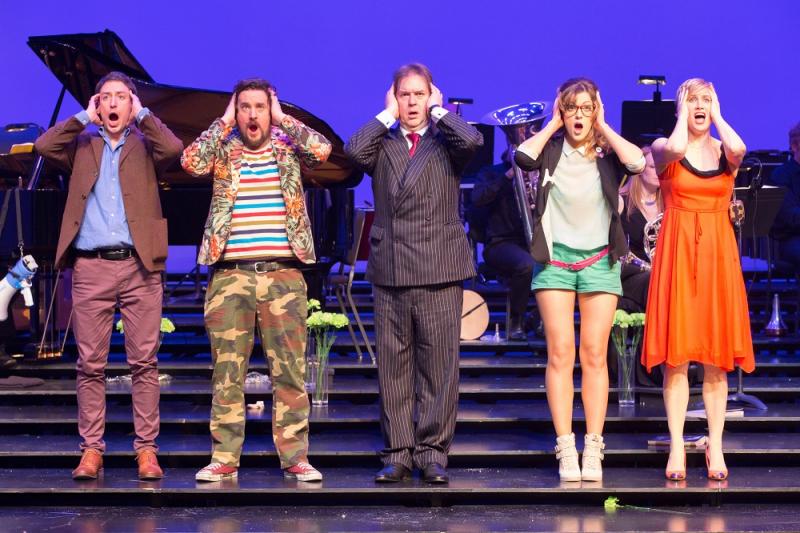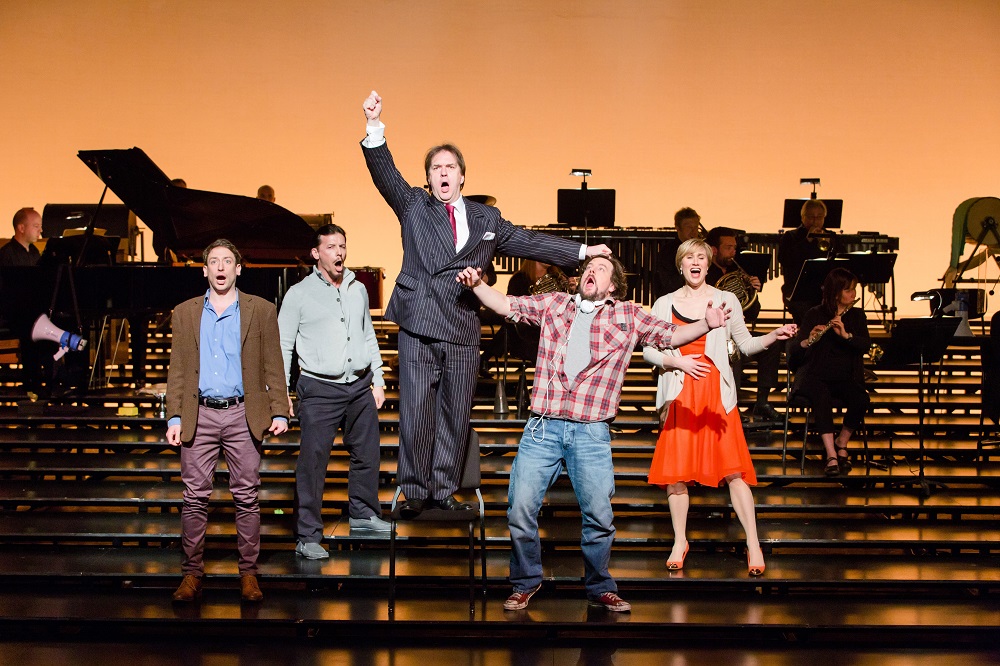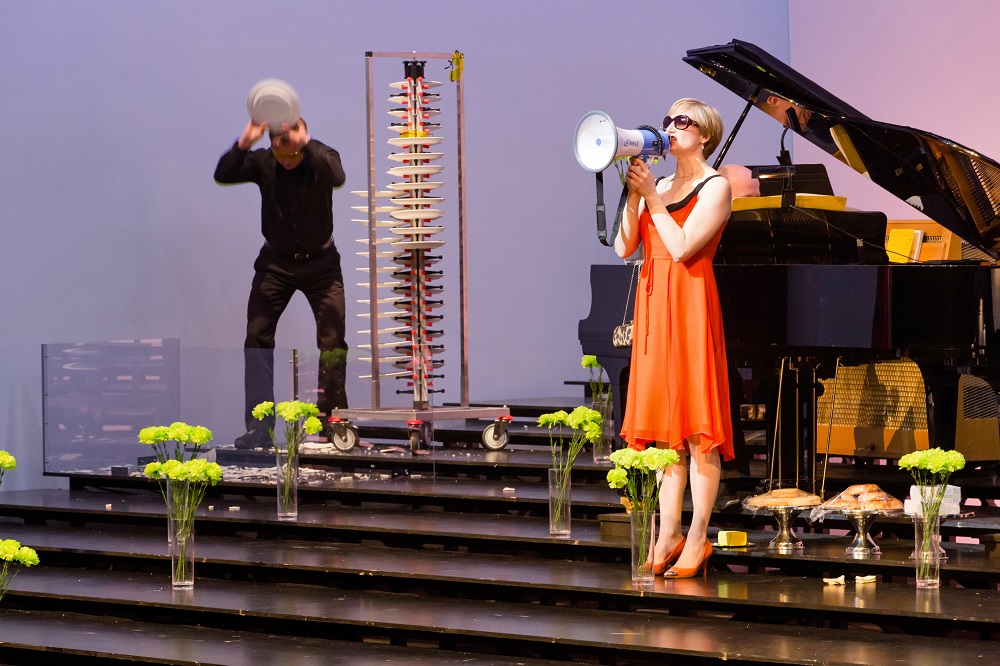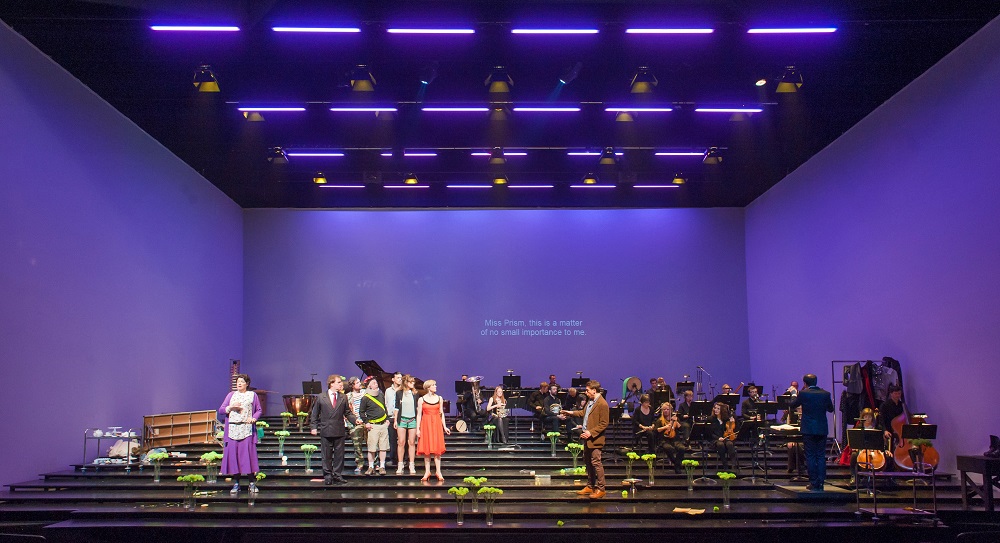The Importance of Being Earnest, Royal Opera, Barbican | reviews, news & interviews
The Importance of Being Earnest, Royal Opera, Barbican
The Importance of Being Earnest, Royal Opera, Barbican
Smashing time with Gerald Barry's crazy-precise operatic whizz through Wilde

Some new operas worth their salt work a slow, sophisticated charm, but the handful that holler "masterpiece" grab you from the start and don't let go.
In shedding two-thirds of the play without even aficionados much missing what's gone, and introducing his own meticulous comic – some would argue tragi-comic – sense of timing even in the silences and the notated spoken passages, Barry may even have made the work foolproof against any inept productions that may pop up as its popularity spreads around the world (Gray's, happily, is not in that category).
 This composer's art is analogous to the perfection of Richard Jones's theatre and opera direction. In Jones's Puccini Gianni Schicchi – another superlative operatic comedy in itself – no gag outstays its welcome. In the same way, Barry's Earnest never settles on any mode for too long as it moves between machine-gun, almost automata-like patter and paradoxically angular lyricism, dissonant energy and grinding banality (pictured above: Alan Ewing's Lady Bracknell turns her Ode to Joy into a dictator's rant).
This composer's art is analogous to the perfection of Richard Jones's theatre and opera direction. In Jones's Puccini Gianni Schicchi – another superlative operatic comedy in itself – no gag outstays its welcome. In the same way, Barry's Earnest never settles on any mode for too long as it moves between machine-gun, almost automata-like patter and paradoxically angular lyricism, dissonant energy and grinding banality (pictured above: Alan Ewing's Lady Bracknell turns her Ode to Joy into a dictator's rant).
Fury seems to be the unifying tone, buzzing round each of the well-tempered duologues or ensembles. The Britten Sinfonia under Tim Murray took just a bit of time last night to dare, trumpet and horn lines chucking perfection in favour of stridency; Gray, on the other hand, wastes no time in summoning his semi-puppets from the front of the stalls up onto the stepped stage where the instrumentalists are very much part of the action. (We've recently had the ENO Magic Flute with its raised orchestra conjuring a singular complicity, and direct lines of communication with the audience, blazing under Mark Wigglesworth's baton). Franz Peter David's lighting is as much a participant as anything else in this total work of meticulously choreographed anarchy.
The full vocal ensemble, including the two rhythmically precise, dramatically important cameos – Simon Wilding's rude Lane/Merriman and Kevin West's Canon Chasuble – has perfected its interplay since last time; as before, each principal character is a distinct personality. The girls are now true perfection: Claudia Boyle, previously another plucky Victorian maiden in Mike Leigh's ENO G&S and here the only newcomer to the main gang of six, is a cut-glass high-soprano Cecily (though in a generally clear delivery of the text, don't expect to make out the words "They have been eating muffins" on a high A).
 Her megaphoned spat with Gwendolen, a clipped duel to the death even before revelations sour relations, now has the most perfect Wildean dialogue you'll ever hear from Stephanie Marshall (pictured left); you wouldn't see a better Miss Fairfax on stage. As often as I've gone over the scene on the recording of the Barbican UK premiere, not least for students, the smashing of 40 plates and the percussive interruptions still make me weep with laughter.
Her megaphoned spat with Gwendolen, a clipped duel to the death even before revelations sour relations, now has the most perfect Wildean dialogue you'll ever hear from Stephanie Marshall (pictured left); you wouldn't see a better Miss Fairfax on stage. As often as I've gone over the scene on the recording of the Barbican UK premiere, not least for students, the smashing of 40 plates and the percussive interruptions still make me weep with laughter.
You probably wouldn't find a better John/Jack to deal with Barry's high-lying tenor writing than Paul Curievici, either. The Monty Pythonesque silly walk/hornpipe Gray asks him and Alan Ewing's pinstriped Lady Bracknell to execute could fall flat in a less accomplished singer-actor's hands (or feet). Ewing plays it straight until Lady B's "version" of Schiller's Ode to Joy erupts in fascist yelling.
Benedict Nelson's Algernon makes a good laid-back foil to Curievici's friend/brother. "I like his hair so much," as Boyle sings in Pucciniesque rapture at the end of a typically compact scene where the very name of Algernon sets off a horrified, brilliant orchestral riff each time (only half of it for "Algy"). Marshall's spasms at "Jack" (I don't remember them from first time around) are one of the funniest things in a laugh-out-loud evening. To complement the basso profundo of Ewing's Lady, trailing inky-black instrumental depths and dissonant jabs, we have the inimitable contralto tones of Hilary Summers as Miss Prism – suitably not quite with us in the empty rustic idyll, an expressive face made for comedy and the vital icing on the cake in the denouement (pictured below).
 The question often arises as to what a non-English-speaker or anyone unfamiliar with the play might make of Barry's setting. I'd argue that unlike Shostakovich's The Nose, which is a music-drama incomprehensible without knowledge of the text, there's enough going on here to give musical pleasure, or pain, throughout, from the pre-recorded piano frenzy at the start, played by Barry himself, through to the smashing of the last eight plates on a fierce final crescendo. You may even come out humming something as catchy as the Act III Prelude with its air of post-coital tristesse (and "Auld Lang Syne" too, of course). It's a virtuoso piece as much for the players – who also have to participate vocally – as the singers. As I said, you know a masterpiece when you hear one, and the operatic Importance is here to stay.
The question often arises as to what a non-English-speaker or anyone unfamiliar with the play might make of Barry's setting. I'd argue that unlike Shostakovich's The Nose, which is a music-drama incomprehensible without knowledge of the text, there's enough going on here to give musical pleasure, or pain, throughout, from the pre-recorded piano frenzy at the start, played by Barry himself, through to the smashing of the last eight plates on a fierce final crescendo. You may even come out humming something as catchy as the Act III Prelude with its air of post-coital tristesse (and "Auld Lang Syne" too, of course). It's a virtuoso piece as much for the players – who also have to participate vocally – as the singers. As I said, you know a masterpiece when you hear one, and the operatic Importance is here to stay.
- At the Barbican Theatre to 3 April; then touring to New York's Rose Theatre 2-4 June
- Livestreamed on 2 April at 7.25pm
rating
Share this article
The future of Arts Journalism
You can stop theartsdesk.com closing!
We urgently need financing to survive. Our fundraising drive has thus far raised £49,000 but we need to reach £100,000 or we will be forced to close. Please contribute here: https://gofund.me/c3f6033d
And if you can forward this information to anyone who might assist, we’d be grateful.

Subscribe to theartsdesk.com
Thank you for continuing to read our work on theartsdesk.com. For unlimited access to every article in its entirety, including our archive of more than 15,000 pieces, we're asking for £5 per month or £40 per year. We feel it's a very good deal, and hope you do too.
To take a subscription now simply click here.
And if you're looking for that extra gift for a friend or family member, why not treat them to a theartsdesk.com gift subscription?
more Opera
 First Person: Kerem Hasan on the transformative experience of conducting Jake Heggie's 'Dead Man Walking'
English National Opera's production of a 21st century milestone has been a tough journey
First Person: Kerem Hasan on the transformative experience of conducting Jake Heggie's 'Dead Man Walking'
English National Opera's production of a 21st century milestone has been a tough journey
 Madama Butterfly, Irish National Opera review - visual and vocal wings, earthbound soul
Celine Byrne sings gorgeously but doesn’t round out a great operatic character study
Madama Butterfly, Irish National Opera review - visual and vocal wings, earthbound soul
Celine Byrne sings gorgeously but doesn’t round out a great operatic character study
 theartsdesk at Wexford Festival Opera 2025 - two strong productions, mostly fine casting, and a star is born
Four operas and an outstanding lunchtime recital in two days
theartsdesk at Wexford Festival Opera 2025 - two strong productions, mostly fine casting, and a star is born
Four operas and an outstanding lunchtime recital in two days
 The Railway Children, Glyndebourne review - right train, wrong station
Talent-loaded Mark-Anthony Turnage opera excursion heads down a mistaken track
The Railway Children, Glyndebourne review - right train, wrong station
Talent-loaded Mark-Anthony Turnage opera excursion heads down a mistaken track
 La bohème, Opera North review - still young at 32
Love and separation, ecstasy and heartbreak, in masterfully updated Puccini
La bohème, Opera North review - still young at 32
Love and separation, ecstasy and heartbreak, in masterfully updated Puccini
 Albert Herring, English National Opera review - a great comedy with depths fully realised
Britten’s delight was never made for the Coliseum, but it works on its first outing there
Albert Herring, English National Opera review - a great comedy with depths fully realised
Britten’s delight was never made for the Coliseum, but it works on its first outing there
 Carmen, English National Opera review - not quite dangerous
Hopes for Niamh O’Sullivan only partly fulfilled, though much good singing throughout
Carmen, English National Opera review - not quite dangerous
Hopes for Niamh O’Sullivan only partly fulfilled, though much good singing throughout
 Giustino, Linbury Theatre review - a stylish account of a slight opera
Gods, mortals and monsters do battle in Handel's charming drama
Giustino, Linbury Theatre review - a stylish account of a slight opera
Gods, mortals and monsters do battle in Handel's charming drama
 Susanna, Opera North review - hybrid staging of a Handel oratorio
Dance and signing complement outstanding singing in a story of virtue rewarded
Susanna, Opera North review - hybrid staging of a Handel oratorio
Dance and signing complement outstanding singing in a story of virtue rewarded
 Ariodante, Opéra Garnier, Paris review - a blast of Baroque beauty
A near-perfect night at the opera
Ariodante, Opéra Garnier, Paris review - a blast of Baroque beauty
A near-perfect night at the opera
 Cinderella/La Cenerentola, English National Opera review - the truth behind the tinsel
Appealing performances cut through hyperactive stagecraft
Cinderella/La Cenerentola, English National Opera review - the truth behind the tinsel
Appealing performances cut through hyperactive stagecraft
 Tosca, Royal Opera review - Ailyn Pérez steps in as the most vivid of divas
Jakub Hrůša’s multicoloured Puccini last night found a soprano to match
Tosca, Royal Opera review - Ailyn Pérez steps in as the most vivid of divas
Jakub Hrůša’s multicoloured Puccini last night found a soprano to match

Add comment